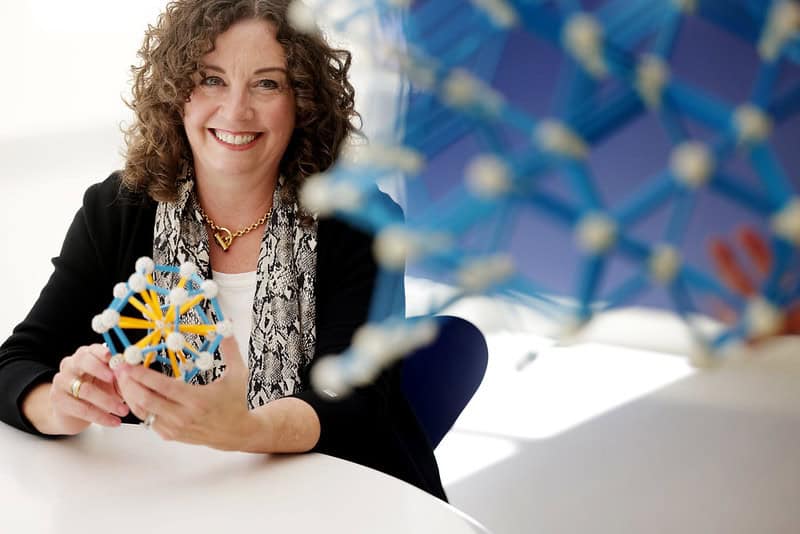
Sharon Glotzer receives 2025 Peter Debye Award from the American Chemical Society
The award recognizes Glotzer’s inventive contributions to the theory, modeling, and simulation of colloidal particles for self-assembly.

The award recognizes Glotzer’s inventive contributions to the theory, modeling, and simulation of colloidal particles for self-assembly.
Sharon Glotzer, the Anthony C. Lembke Department Chair of Chemical Engineering, has been selected to receive the prestigious Peter Debye Award in Physical Chemistry. This honor, sponsored by an endowed fund established by the American Chemical Society (ACS) Division of Physical Chemistry, recognizes her inventive contributions to the theory, modeling, and simulation of colloidal particles for self-assembly.
“I’m thrilled and honored for my group’s contributions to be recognized with the ACS Debye Award, “ said Glotzer. “It’s exciting and a wonderful recognition of the many, talented young researchers I’ve had the great pleasure of working with.”
“I’m thrilled and honored for my group’s contributions to be recognized with the ACS Debye Award. It’s exciting and a wonderful recognition of the many, talented young researchers I’ve had the great pleasure of working with.”
Sharon Glotzer
Anthony C. Lembke Department Chair of Chemical Engineering
Glotzer’s work has been influential in predicting an unprecedented diversity of nanoparticle structures and colloidal crystals, influencing both the computational and experimental nanoscience communities. Among her many accolades, Glotzer is credited with introducing transformative concepts such as “patchy particles,” and “entropic bonding”, changing the landscape of nanoscale self-assembly.
Glotzer’s efforts in materials theory and simulations have provided tools for predictive in-silico materials discovery now used by many research groups around the world, including several open-source software packages developed by her group.
Her extensive body of work includes studies demonstrating the emergent directional entropic bonds that facilitate the formation of surprisingly complex structures from faceted nanoparticles. This insight that local, directional entropic forces can lead to order, rather than disorder, revealed that the geometry of submicron-sized assemblies could be predicted based on the geometry of their individual building blocks – in a way that is not possible simply by looking at how particles pack densely.
Glotzer’s innovative simulations have often provided explanations – and predictions – for scores of experimental observations. In one game-changing 2009 study, Glotzer’s group discovered that hard tetrahedrally shaped nanoparticles can self-assemble into a quasicrystal – a prediction that was confirmed experimentally in 2023. Her simulations have profound implications for various scientific and technological fields, from the self-assembly of nanomaterials for applications in optics, energy, and healthcare to robotics.
“She is one of the most innovative and talented researchers in Chemical Physics and Physical Chemistry and deserves – without any doubts – this recognition from ACS for her extraordinary scientific achievements,” said Nick Kotov, the Joseph B. and Florence V. Cejka Professor of Chemical Engineering.
“She is one of the most innovative and talented researchers in Chemical Physics and Physical Chemistry and deserves – without any doubts – this recognition from ACS for her extraordinary scientific achievements.”
Nick Kotov
Joseph B. and Florence V. Cejka Professor of Chemical Engineering
Her collaborative work has spanned prestigious institutions and research groups globally, validating her predictions and spurring further advancements in the field. The structures Glotzer predicted or explained were successfully produced in renowned groups such as those led by Francesco Stellacci at École Polytechnique Fédérale de Lausanne, Christopher B. Murray from the University of Pennsylvania, Oleg Gang from Brookhaven National Laboratory, and Chad Mirkin from Northwestern University.
“We’ve had the great fortune of collaborating with dozens of different research groups around the world, using simulation to help guide, predict, or explain their experimental discoveries,” Glotzer said. “These collaborations are fun and fantastic opportunities to improve our ability to study increasingly complex particle systems using computer simulation.”
Glotzer’s recognition with the Peter Debye Award highlights her contributions to physical chemistry and her research in the theory, modeling, and simulation of colloidal particles for self-assembly. Her work has advanced understanding of nanoscale materials and inspired future innovations in technology and material science.
In addition to this honor, Glotzer is the John Werner Cahn Distinguished University Professor of Engineering, the Stuart W. Churchill Collegiate Professor of Chemical Engineering, a professor of materials science and engineering, macromolecular science and engineering, physics, and applied physics, and the science lead of the NSF-funded Center for Complex Particle Systems (COMPASS) at the University of Michigan.